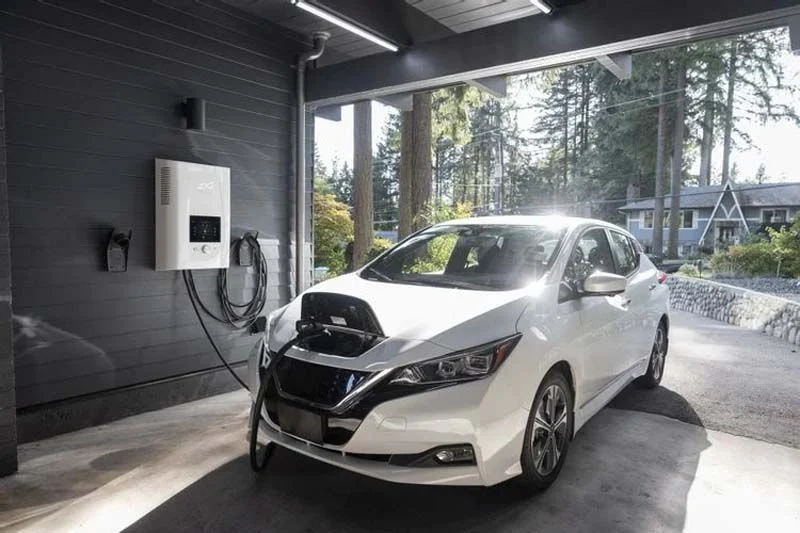![[feature] How to Charge Your Electric Cars at Home](https://blogger.googleusercontent.com/img/a/AVvXsEhBJOVBb-r1fPD1b_nHWUJBey_N_YfVkXLNpwivppCyJhfc-I28iESBndA7TfJXzunGiLCtAulSZGWoBQ2MjHaLGdwJ2zOLr_Y3lXNMPMR66Tomghd6LUZcZsvO6P8cZGp9f5NDhaRBQItMw6VD_xtCozgDKeNpFBaPG1sRyyy4bkgyUqk8t8ZAsj-6=s16000-rw) |
| © Provided by MUO |
By Justin Bennett-Cohen, MUO
The world of electric vehicles is an exciting place. They're incredibly fun to drive, have futuristic designs, and aim to improve the amount of carbon going into the atmosphere. Once you've considered switching to an electric vehicle, you need to decide how you'll feasibly charge it.
If you own your residence, you may wonder if it's worth buying a home charger or if you can simply rely on public EV charging networks. So, should you get an EV charger installed in your garage? Let's find out if it best suits your needs.
Read More: Top Five Maintenance Tips for Electric Car Owners
What Is a Home EV Charger?
 |
| © Provided by MUO |
As the name suggests, a home EV charger is simply a piece of charging equipment for your electric vehicle designed for home use. Home EV chargers are a great way to save money, as you won't need to pay the public charging rate, and you won't need to waste time waiting for your vehicle to charge. And most importantly, you can forget about range anxiety. Just plug in your car when you're home from work and wake up to a fully charged vehicle in the morning.
Chargers designed for your home usually have various installation methods. Some level 2 chargers can plug into the nearest 240-volt outlet available in most homes, while others would require hardwiring with the help of an electrician. They tend to be slower than many public charging networks, but that's what you want to keep your electric vehicle's battery healthy; it will also save you money on your electric bill.
How Fast Are Home EV Chargers?
 |
| © Provided by MUO |
Most EV chargers available currently for your home are slower than those you find at public charging networks across the United States. However, this is exactly what you want with a home charger.
According to ChargePoint, the largest EV charging network in the US:
"fast charging delivers a lot of power, which can create heat that will "stress" batteries more than AC charging. Some vehicles also have battery conditioning designed to get batteries to the optimal temperature for charging. While heat stress has minimal impact on battery life over time, it's still a good idea to rely on Level 2 for day-to-day charging."
Level 2 chargers are a great way to keep your EV's batteries in great health in the long term. With a rating of around 40 amps, level 2 home chargers tend to output between 9 and 10 kW. This will be good to add about 30 miles of range per hour to your EV. Although it's slower than public DC fast chargers, this is a perfect speed to fully charge your vehicle overnight.
Read More: What do I Need to Know about the Electric Vehicle Home Charging Scheme Changes in 2022
Which Home Charger Is Right for My EV?
 |
| © Provided by MUO |
As the number of electric vehicles increases each year, so is the availability of public charging networks and home chargers. But which one is perfect for your EV? Well, It mainly depends on your charging port.
Thankfully, most electric vehicles on the market today don't use a proprietary charging port except for Tesla. When Tesla first began making the Model S, no standard port was being used, which is why Elon Musk designed a slimmer connector that could support high output charging.
Most EVs you'll find use a CCS port. These are compatible with plenty of DC fast chargers in various networks around the country. One of the few EVs left on the market that does not have a CCS port in the US is the Nissan Leaf, which uses a CHAdeMO port.
It's important to note that companies that sell home chargers also have their own public charging networks that support multiple charging ports. These companies want their chargers to be compatible with several modern electric vehicles.
For example, ChargePoint's Home Flex charger, retailing for $699, supports all vehicles from the Tesla Model 3 to Mazda's MX-30 to the Nissan Leaf. Buying a charger such as this would be a great way to future-proof your home's charging station in case you get various kinds of EVs in the future.
Tesla also sells its own home charger called the Wall Connector. It has several benefits; the Wall Connector is more affordable at $550 and can output up to 11.5kW of power. Tesla will even connect you with a Tesla-certified technician to install it in your home. If you currently own a Tesla and believe you'll own more Teslas in the future, this may be the way to go.
Should You Buy a Home EV Charger?
If you own a home and don't mind getting one professionally installed, a home EV charger is a no-brainer. This is one of the most important parts of owning an electric vehicle. Minimizing range anxiety is the best way to enjoy driving your new piece of technology with peace of mind.Level 2 home chargers range from $400 and $700, and although they're expensive, they're a one-time purchase that will make your life easier in the long run.
However, if you live in an apartment building and cannot install a home charger, you can still buy an EV! Take a look at the charging networks on your daily commute, and see if scheduling when to charge may work out for your circumstance.
See more at MUO






















